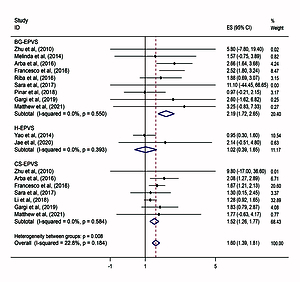Current issue
Archive
Manuscripts accepted
About the Journal
Editorial office
Editorial board
Section Editors
Abstracting and indexing
Subscription
Contact
Ethical standards and procedures
Most read articles
Instructions for authors
Article Processing Charge (APC)
Regulations of paying article processing charge (APC)
NEUROLOGY / SYSTEMATIC REVIEW/META-ANALYSIS
The associations between Enlarged Perivascular Spaces and partial Clinical symptoms: a meta-analysis
1
Hebei General Hospital, China
Submission date: 2022-05-12
Final revision date: 2022-07-23
Acceptance date: 2022-08-24
Online publication date: 2022-09-09
KEYWORDS
TOPICS
ABSTRACT
Introduction:
Enlarged perivascular spaces (EPVS) are ubiquitous in the elderly and have insidious onset characteristics. Its correlation with clinical symptoms is easily overlooked and controversial. The related clinical symptoms that EPVS may cause were studied using Meta-analysis.
Material and methods:
Relevant studies up to April 2022 were extracted from PubMed, Embase, Cochrane, OVID, and Web of Science. Odds ratios (ORs) and 95% confidence interval (CI) were used to estimate the strength of the correlation.
Results:
Of the 6622 articles identified, 32 studies were eligible, enrolling a total of 19987 people. EPVS was associated with the risk of cognitive impairment (OR: 1.60, 95 % CI: 1.39- 1.81), motor impairment (OR: 2.24, 95 % CI: 1.22- 3.25), sleep disturbance (OR: 1.81, 95% CI: 1.34-2.28), depressive symptoms (OR: 1.54, 95 % CI: 1.14- 1.95), but was not significantly associated with the occurrence of stroke ( OR: 0.97, 95 % CI: 0.74-1.21). Results of subgroup analysis showed that basal ganglia (BG) EPVS were more associated with cognitive impairment (OR: 2.19, 95% CI: 1.72- 2.65) and sleep disturbance(OR: 1.74, 95 % CI: 1.20- 2.29).
Conclusions:
Our findings suggested that people with EPVS may be at a greater risk for cognitive impairment, motor impairment, sleep disturbance, and depressive symptoms. This will inform future treatments.
Enlarged perivascular spaces (EPVS) are ubiquitous in the elderly and have insidious onset characteristics. Its correlation with clinical symptoms is easily overlooked and controversial. The related clinical symptoms that EPVS may cause were studied using Meta-analysis.
Material and methods:
Relevant studies up to April 2022 were extracted from PubMed, Embase, Cochrane, OVID, and Web of Science. Odds ratios (ORs) and 95% confidence interval (CI) were used to estimate the strength of the correlation.
Results:
Of the 6622 articles identified, 32 studies were eligible, enrolling a total of 19987 people. EPVS was associated with the risk of cognitive impairment (OR: 1.60, 95 % CI: 1.39- 1.81), motor impairment (OR: 2.24, 95 % CI: 1.22- 3.25), sleep disturbance (OR: 1.81, 95% CI: 1.34-2.28), depressive symptoms (OR: 1.54, 95 % CI: 1.14- 1.95), but was not significantly associated with the occurrence of stroke ( OR: 0.97, 95 % CI: 0.74-1.21). Results of subgroup analysis showed that basal ganglia (BG) EPVS were more associated with cognitive impairment (OR: 2.19, 95% CI: 1.72- 2.65) and sleep disturbance(OR: 1.74, 95 % CI: 1.20- 2.29).
Conclusions:
Our findings suggested that people with EPVS may be at a greater risk for cognitive impairment, motor impairment, sleep disturbance, and depressive symptoms. This will inform future treatments.
We process personal data collected when visiting the website. The function of obtaining information about users and their behavior is carried out by voluntarily entered information in forms and saving cookies in end devices. Data, including cookies, are used to provide services, improve the user experience and to analyze the traffic in accordance with the Privacy policy. Data are also collected and processed by Google Analytics tool (more).
You can change cookies settings in your browser. Restricted use of cookies in the browser configuration may affect some functionalities of the website.
You can change cookies settings in your browser. Restricted use of cookies in the browser configuration may affect some functionalities of the website.



